By Mae Thiwari
March 22, 2022 – On the occasion of World Water Day 2022, the Asian Institute of Technology (AIT), in partnership with Stockholm Environment Institute (SEI) & Sustainable Mekong Research Network (SUMERNET), Chulalongkorn University, and Thailand’s Department of Groundwater Resources, organized a celebration to raise an awareness on the importance of groundwater. Despite being out of sight, the impact of groundwater was brought to the surface through activities that are “Making the Invisible Visible”.

World Water Day is an annual United Nations observance day held on March 22 to highlight the importance of fresh water and to advocate for the sustainable management of freshwater resources. The theme of this year’s celebration is “Groundwater – Making the Invisible Visible.”
Groundwater accounts for 98% of water on land areas. It provides almost 50% of all drinking water worldwide, 40% of water for irrigated agriculture and about 30% of water required for industry. Across Asia, groundwater accounts for over 25% of the total usage of all water in irrigation, food production and industry, as well as domestic use. It sustains ecosystems, maintains the baseflow of rivers and prevents land subsidence and seawater intrusion. Moreover, groundwater is an important part of climate change adaptation process.
Due to its invisible character, however, groundwater is out of sight and out of mind for most people.
Making the Invisible Visible
To bring groundwater into sight and into mind, the event featured remarks, speeches, World Water Day messages, launch of initiatives, and announcement of photo competition focusing the hidden resource. Thailand’s Deputy Director General of the Department of Groundwater Resources, Dr. Surin Worakijthamrong, shared his experience of working with groundwater for over two decades.
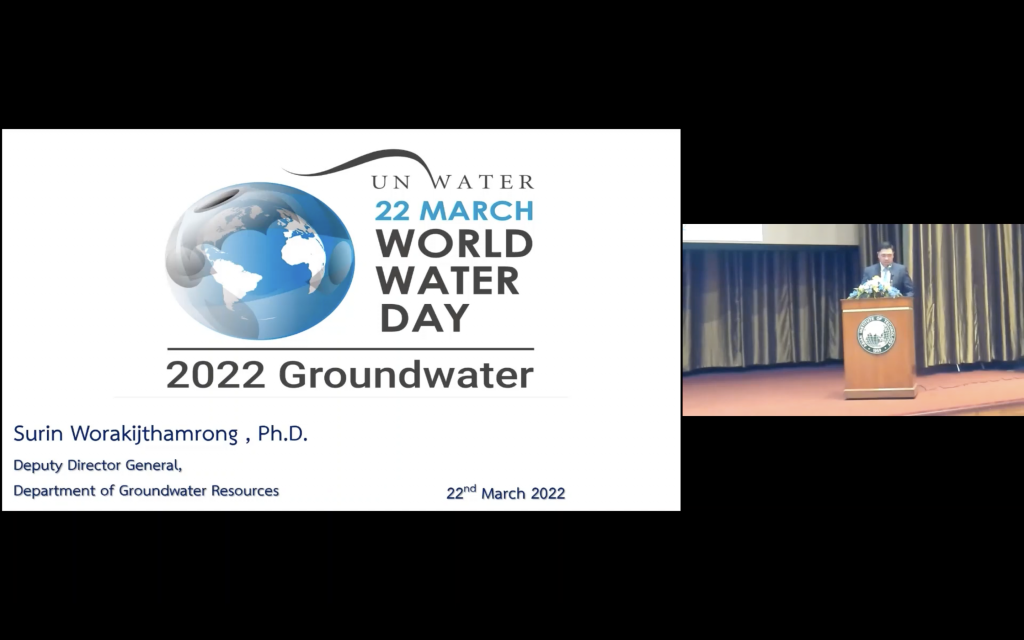 In his keynote speech “Sustainable Management of Groundwater Resources in Thailand”, Dr. Surin gave an example of the recently completed project supported by King Rama X, utilizing groundwater through the biggest borehole in the local area with six production wells. The project provides a large-scale groundwater supply for drought relief, benefiting large number of people in rural communities. Based this case and other from his experience, the Deputy Director General highlighted the “three pillars” for Sustainable Groundwater Management: consisting of ‘Development’ to ensure that water supply meets water demand; ‘Monitor’ to keep track of water supply; and ‘Collaboration’ with stakeholders to ensure that local communities truly benefit from the initiative. “If you have the three pillars, I’m sure that you have the sustainable groundwater management,” Dr. Surin concluded.
In his keynote speech “Sustainable Management of Groundwater Resources in Thailand”, Dr. Surin gave an example of the recently completed project supported by King Rama X, utilizing groundwater through the biggest borehole in the local area with six production wells. The project provides a large-scale groundwater supply for drought relief, benefiting large number of people in rural communities. Based this case and other from his experience, the Deputy Director General highlighted the “three pillars” for Sustainable Groundwater Management: consisting of ‘Development’ to ensure that water supply meets water demand; ‘Monitor’ to keep track of water supply; and ‘Collaboration’ with stakeholders to ensure that local communities truly benefit from the initiative. “If you have the three pillars, I’m sure that you have the sustainable groundwater management,” Dr. Surin concluded.
In line with Thailand’s Deputy Director General of Groundwater Resources department,  the keynote speech on “Groundwater – Making the Invisible Visible” by Dr. Neno Kukuric, Former Director of International Groundwater Resources Assessment Centre (IGRAC) and Coordinator of UN-Water Task Force WWW2022, stressed the need to step up monitoring and to improve assessment to inform management and governance of groundwater. Noting that most of the countries share aquifers, so the changes in aquifers in quality and quantity can lead to international problems – or it can be an opportunity for countries to cooperate, to mitigate or eliminate problems and increase overall benefit from groundwater.
the keynote speech on “Groundwater – Making the Invisible Visible” by Dr. Neno Kukuric, Former Director of International Groundwater Resources Assessment Centre (IGRAC) and Coordinator of UN-Water Task Force WWW2022, stressed the need to step up monitoring and to improve assessment to inform management and governance of groundwater. Noting that most of the countries share aquifers, so the changes in aquifers in quality and quantity can lead to international problems – or it can be an opportunity for countries to cooperate, to mitigate or eliminate problems and increase overall benefit from groundwater.
As the pressure on groundwater increases, international cooperation and knowledge sharing are crucial for tackling serious pollution and depletion problems worldwide, Dr. Kukuric highlighted. With a quote from a profound philosophical tale “The Little Prince” by Antoine de Saint-Exupéry, the Coordinator UN-Water reiterated the importance groundwater, “It is only with the heart that one can see rightly. What is essential is invisible to the eye.”
From sharing the experience and practice, to sharing an overview of knowledge products by various UN agencies for sustainable groundwater management, the keynote speeches noted that still more work to be done with collaboration from international community.
“We cannot simply continue exploiting groundwater as before. We need to maintain clear and evidence-based sustainable water management,” the Director of SEI Asia Center, Mr. Niall O´Connor urged in his opening remarks. “We urgently need to understand the nature and behavior of these groundwater systems, and this will allow us to adapt and adopt policies that can help regulate the instruction of water and sustainability of ecosystems.”
Stepping up efforts
To step up efforts, AIT and partners also took this opportunity to launch several initiatives. Dr. Piyatida Ruangrassamee, Assistant Professor from the Department of Water Resources Engineering, Chulalongkorn University, launched the Proceedings of “THA 2022 International Conference on Moving Towards Sustainable Water and Climate Change Management after COVID-19”. Dr. Thanapon Piman, Senior Research Fellow of SEI, Asia Center, and Ms. Tipaksorn Manpati, SUMERNET Media partner, launched SEI & SUMERNET Publications “Chindwin Futures: Natural resources, livelihoods, institutions, and climate change in Myanmar’s Chindwin River Basin” and “Importance of Mekong River”.
As water is at the heart of AIT since its establishment in 1959, as noted by Prof. Dieter Trau, the Dean of AIT School of Engineering and Technology, the institute took the most important day to highlight the importance of water to launch, not just one, but four initiatives.
 1) Centre for Water and Climate Adaptation (CWCA). Launched by Dr. Mukand S. Babel, Professor of AIT Water Engineering and Management, the center aims to serve as a catalyst in helping the Asia Pacific and beyond, to move up the water security ladder by leveraging on AIT’s strength and expertise. It is closely working with international organizations: DAAD Global Water and Climate Adaptation Centre – Aachen, Bangkok, Chennai and Dresden (ABCD Centre) and UNFCCC CASSTT Adaptation Academy, and it is open to collaboration with other partners.
1) Centre for Water and Climate Adaptation (CWCA). Launched by Dr. Mukand S. Babel, Professor of AIT Water Engineering and Management, the center aims to serve as a catalyst in helping the Asia Pacific and beyond, to move up the water security ladder by leveraging on AIT’s strength and expertise. It is closely working with international organizations: DAAD Global Water and Climate Adaptation Centre – Aachen, Bangkok, Chennai and Dresden (ABCD Centre) and UNFCCC CASSTT Adaptation Academy, and it is open to collaboration with other partners.
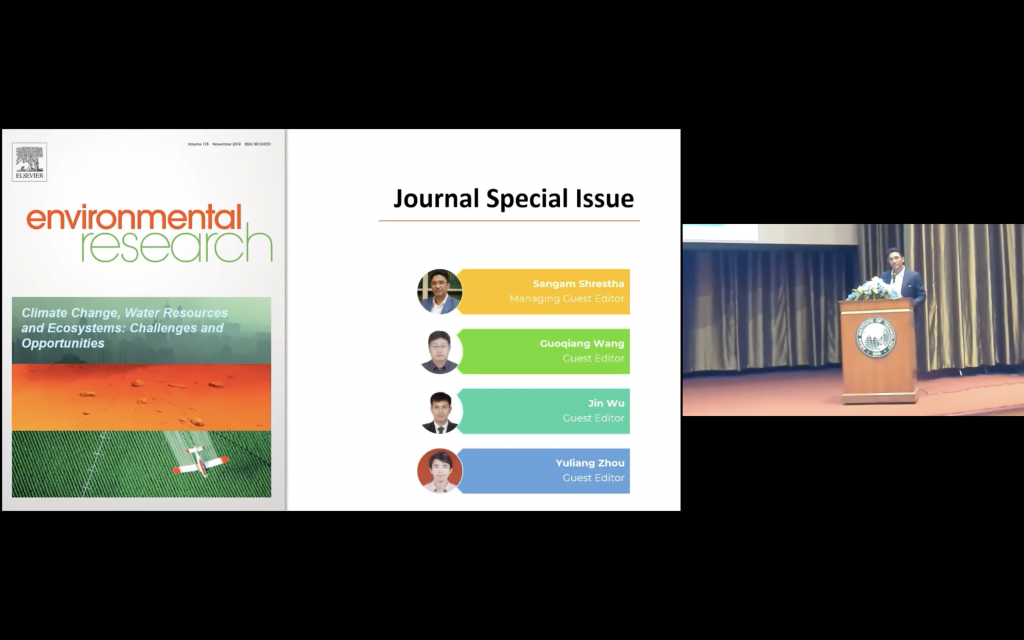 2) Journal Special Issue “Climate Change, Water Resources and Ecosystems: Challenges and Opportunities”. Launched by Dr. Sangam Shrestha, Professor and Head of the Department of Civil and Infrastructure Engineering, the journal is an output of an excellent collaboration between AIT, Beijing Normal University, Beijing University of Technology, and Hefei University of Technology and Science, with an aim to increase the understanding and providing the solutions towards climate change impacts on water resources and ecosystems.
2) Journal Special Issue “Climate Change, Water Resources and Ecosystems: Challenges and Opportunities”. Launched by Dr. Sangam Shrestha, Professor and Head of the Department of Civil and Infrastructure Engineering, the journal is an output of an excellent collaboration between AIT, Beijing Normal University, Beijing University of Technology, and Hefei University of Technology and Science, with an aim to increase the understanding and providing the solutions towards climate change impacts on water resources and ecosystems.
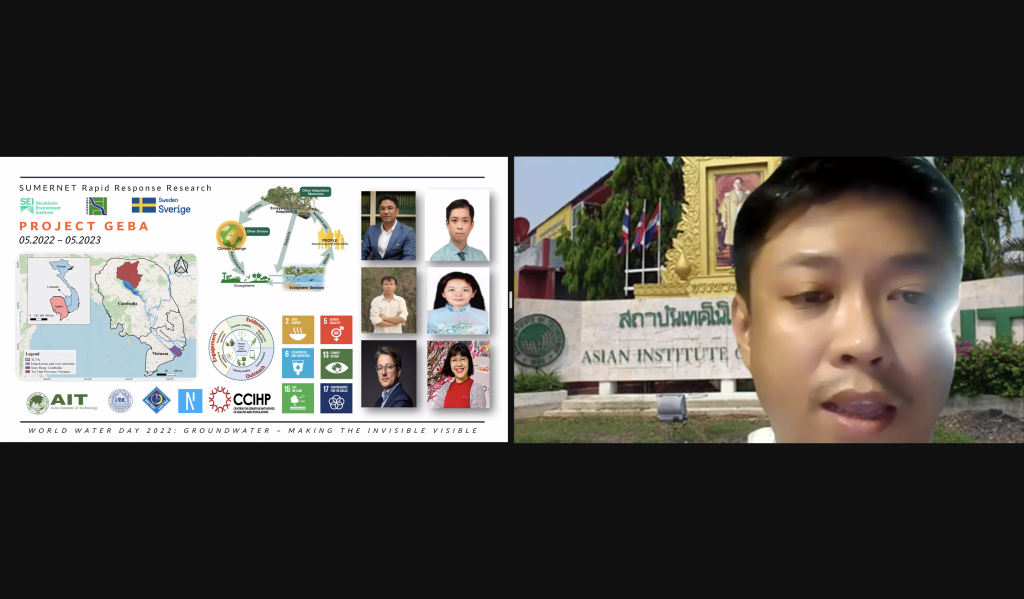 3) GEBA Project: Ecosystem-based Adaptations for Sustainable Groundwater Resources Management in the Transboundary Cambodia-Viet Nam Mekong Delta Aquifer of the Lower Mekong Region. Launched by Dr. Ho Huu Loc, Assistant Professor in AIT Water Engineering and Management, the project aims to create the transformative changes in planning and decision making process in the management of the transboundary aquifers, one of the most important transboundary aquifers in Asia and worldwide.
3) GEBA Project: Ecosystem-based Adaptations for Sustainable Groundwater Resources Management in the Transboundary Cambodia-Viet Nam Mekong Delta Aquifer of the Lower Mekong Region. Launched by Dr. Ho Huu Loc, Assistant Professor in AIT Water Engineering and Management, the project aims to create the transformative changes in planning and decision making process in the management of the transboundary aquifers, one of the most important transboundary aquifers in Asia and worldwide.
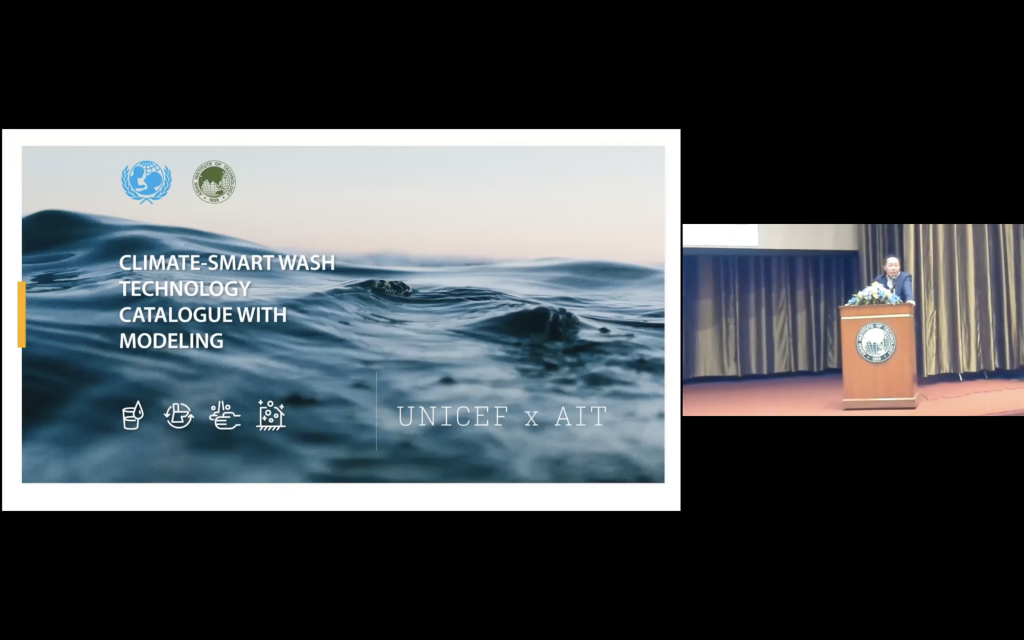 4) UNICEF x AIT "Climate Smart WASH Technology Catalogue". Launched by Dr. Thammarat Koottatep, Professor of AIT Environmental Engineering and Management, the Climate Smart Technology Catalogue provides a list of Water, Sanitation, and Hygiene products and technology that are climate resilient and suitable for climate adaptation. It aims to offer information of how access the water and sanitation systems that may or may not contribute to the Greenhouse Gas emissions or can resist to climate risks.
4) UNICEF x AIT "Climate Smart WASH Technology Catalogue". Launched by Dr. Thammarat Koottatep, Professor of AIT Environmental Engineering and Management, the Climate Smart Technology Catalogue provides a list of Water, Sanitation, and Hygiene products and technology that are climate resilient and suitable for climate adaptation. It aims to offer information of how access the water and sanitation systems that may or may not contribute to the Greenhouse Gas emissions or can resist to climate risks.
None of the initiatives launched today would be possible without collaboration with partners from near and far. As highlighted in the opening speech by AIT President Dr. Eden Woon, “I would like to appeal to multi-party collaboration among the world water day 2022 event organizing institutes – no one can do this alone, this is a global problem, and this is collaborative task.”
Announcement of Photo Competition Winners
As part of raising awareness on groundwater, a photo competition under the theme of “Groundwater: Making Invisible, Visible” was also organized. The photo submissions were evaluated by judges from AIT, SEI and Chulalongkorn University, with 50% of the weight goes to relevance to theme. Of the 19 eligible entries, three winners are:
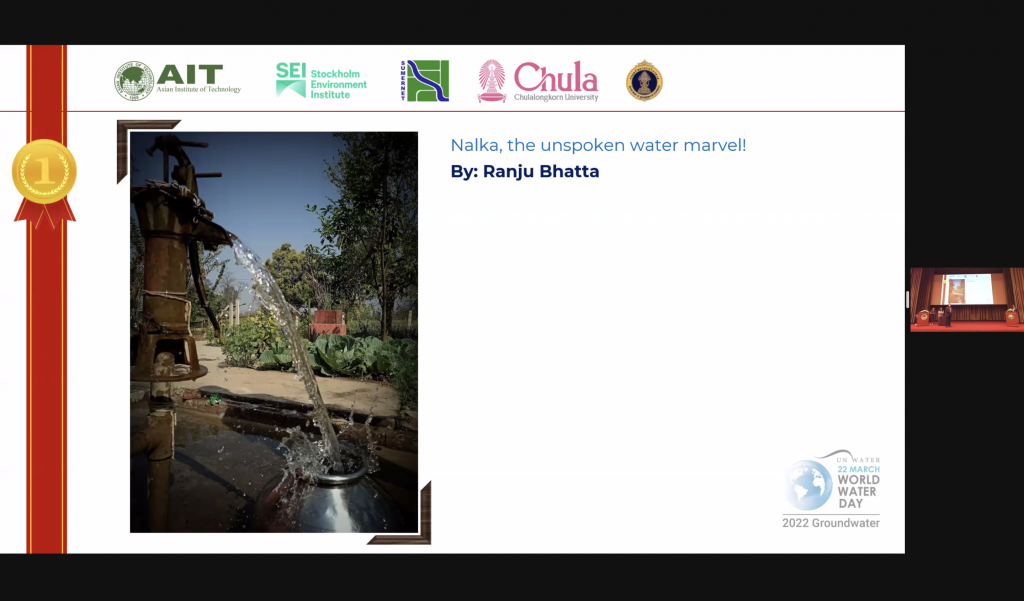
Winner: “Nalka, the unspoken water marvel!” By Ranju Bhatta.

First Runner Up: “Dhunge Dhara – an intricately carved traditional stone fountain found in Nepal” by Arsha Pradhan.
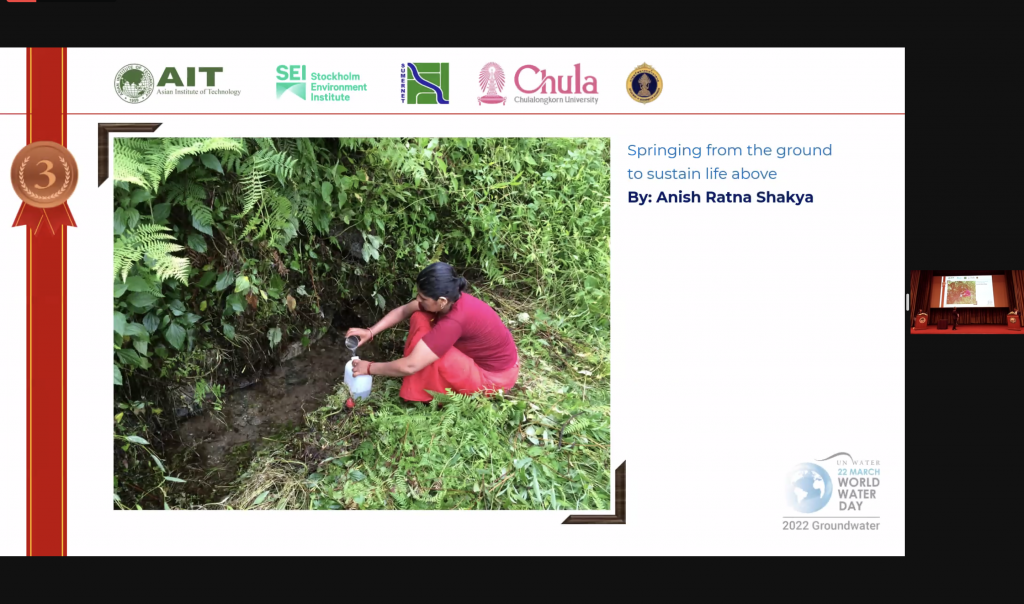
Second Runner Up: “Springing from the ground to sustain life above” by Anish Ratna Shakya.
Watch the full event with World Water Day Messages from H.E. Dr. Sándor Sipos, Ambassador of Hungary to Thailand; Dr. Oranuj Lorphensri, Deputy Permanent Secretary, Ministry of Natural Resources and Environment (MoNRE), Thailand; Dr. Sutat Weesakul, Director, Hydro-Informatics Institute (HII), Ministry of Higher Education, Science, Research and Innovation, Thailand; Ms. AnnaMaria Oltorp, Head of Development Cooperation Section - Regional Asia and the Pacific, Embassy of Sweden, Thailand; Dr. Anoulak Kittikhoun, Chief Executive Officer, Mekong River Commission (MRC) Secretariat; Dr. Roshan Raj Shrestha, Deputy Director, Bill & Melinda Gates Foundation; Dr. Linda Anne Stevenson, Head of Knowledge Management & Scientific Affairs and Deputy Head of Development & Institutional Affairs, Asia-Pacific Network for Global Change Research (APN); and Mr. Saurav KC, Student, Water Engineering and Management, AIT – on https://www.youtube.com/watch?v=np92nTP5vyI

